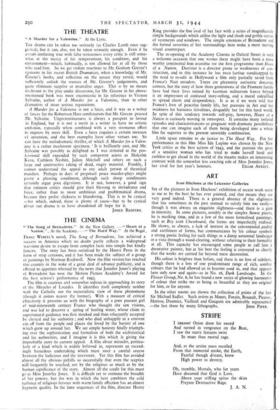"A Murder for a Valentine." At the Lyric.
THE THEATRE
THE drama can be taken too seriously (as Charles Lamb once sug- gested), but it can, also, not be taken seriously enough. Even if he avoids confusing true with false seriousness every critic is still some- what at the mercy of his temperament, his condition and his environment—which, habitually, is not allowed for at all by those who read him. So we get violent reactions to Mr. Graham Greene's Opinions in his recent British Dramatists, when a knowledge of Mr. Greene's books, and reflection on the nature they reveal, would sufficiently unlock the sources of Mr. Greene's judgements, and quite eliminate surprise or neutralise anger. This is by no means irrelevant to the play under discussion, for Mr. Greene in his above- mentioned book was more encomiastic in his reference to Vernon Sylvaine, author of A Murder for a Valentine, than to other dramatists of more serious reputations.
A Murder for a Valentine is not a farce, and it was as a writer of farces for the Robertson Hare combination that Mr. Greene praised Mr. Sylvaine. Unpretentiousness is always a passport to favour in England, but it is not a merit in a writer to have no artistic ambition, especially when combined with a very strenuous effort to impress by mere skill. Even a farce requires a certain measure of invention, and the best examples have other virtues too. So can have the melodramatic thriller, of which A Murder for a Valen- tine is a rather incoherent specimen. • It is brilliantly cast, and Mr. Sylvaine was possibly as delighted as I was irritated at the pro- fessional skill expended by such competent actors as Malcolm Keen, Cathleen Nesbitt, Julien Mitchell and others on such a large and unattractive raking of dead, stagey material. Frankly, I cannot understand the appeal to any adult person of theatrical murders. Perhaps in days of perpetual peace murder-plays might prove a pleasing condiment, although such sharp condiments certainly argue poor digestions. It is not, however, a good sign that eminent critics should give their blessing to melodrama and farce, rather than to more ambitious and problematical drama, because they prefer slickness to blundering. This is to be cynical —for which, indeed, there is plenty of cause—but to be cynical about our drama is to have abandoned all hope for it.






















 Previous page
Previous page